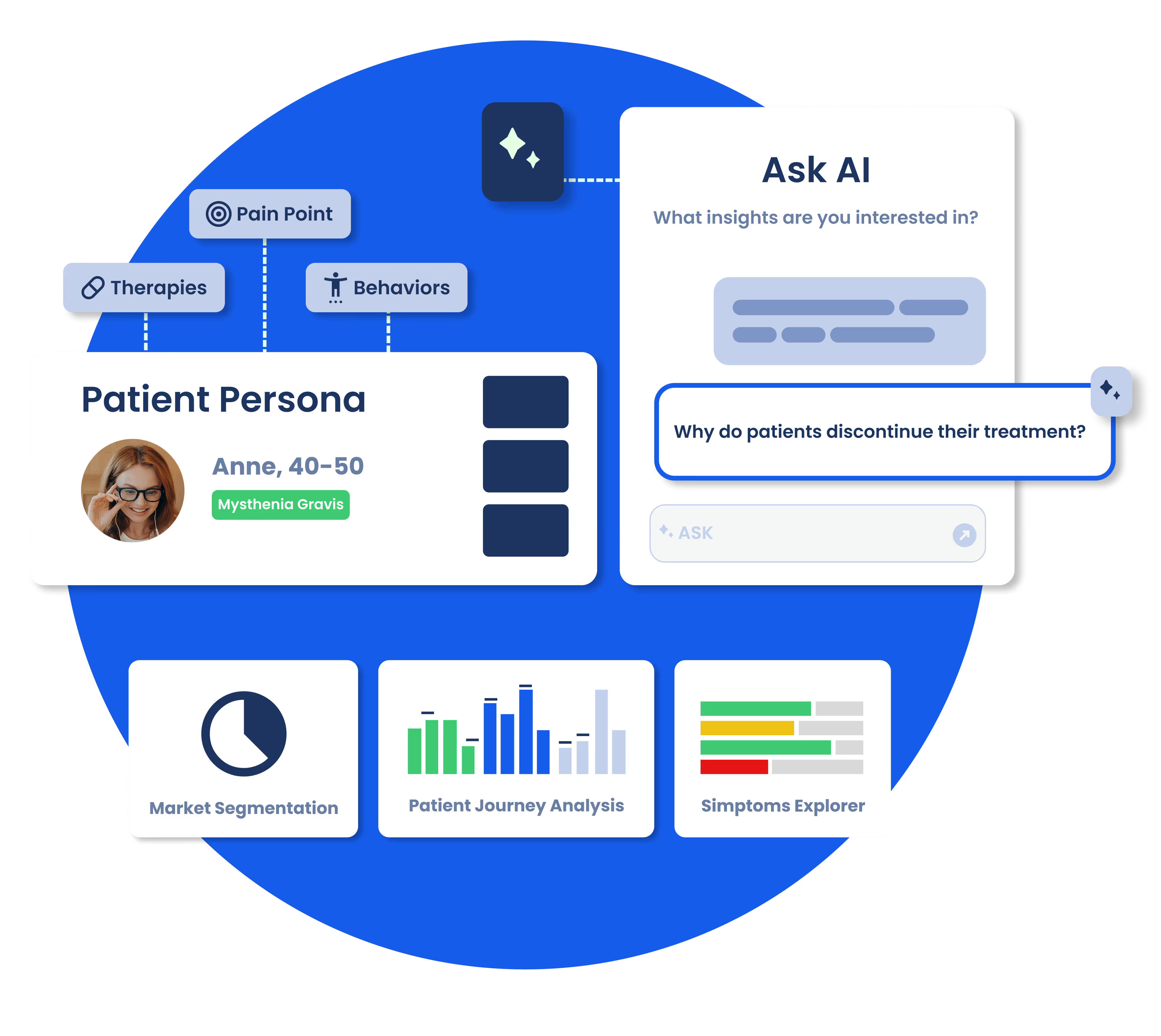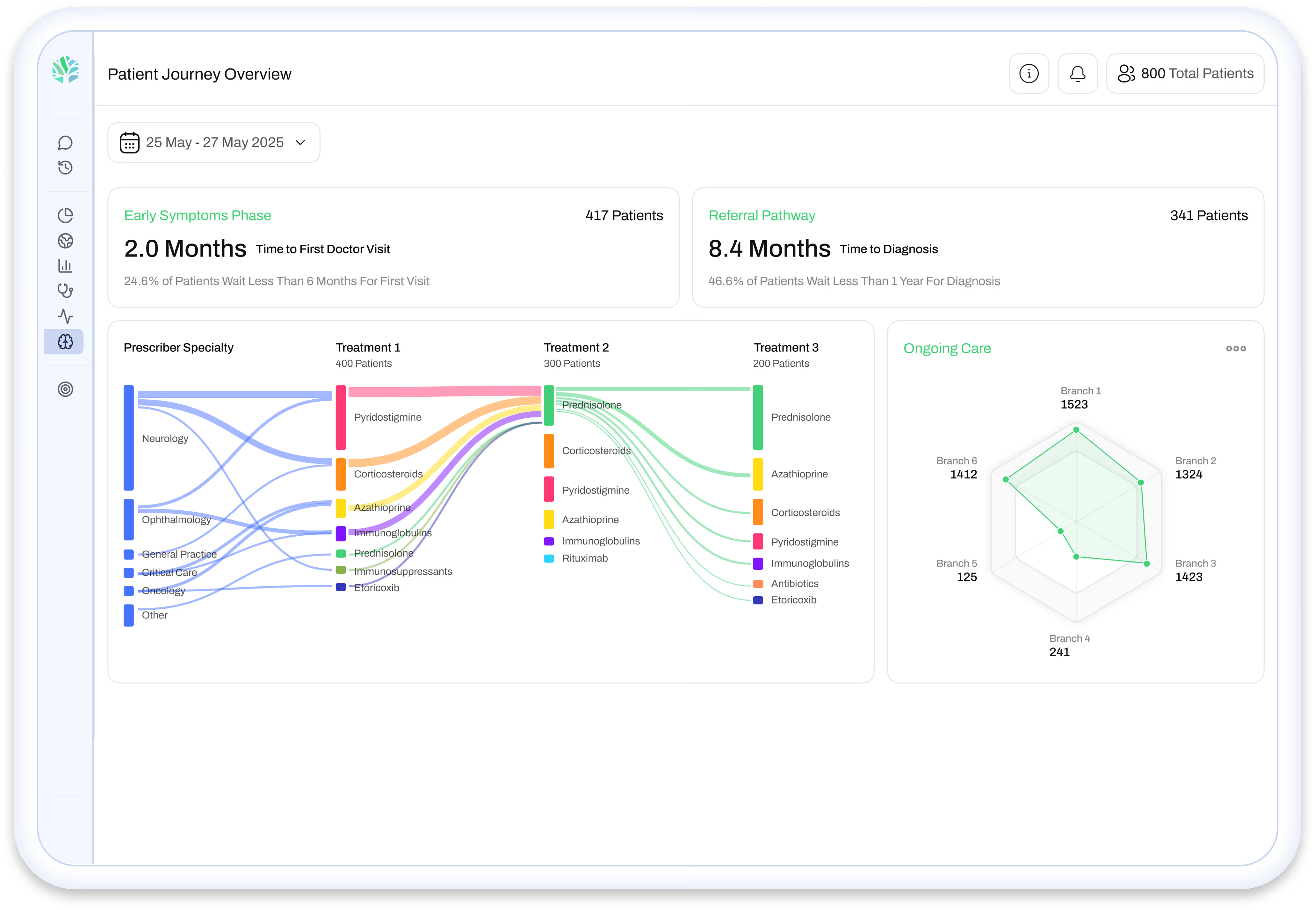TL;DR
AI-driven patient interviews are transforming healthcare research, offering a scalable, real-time way to gather deep, qualitative insights that were previously difficult to capture. Unlike traditional methods, AI can engage thousands of patients across demographics in empathetic conversations, extracting rich data on patient experiences, behaviors, and emotions. This technology provides healthcare companies and patients with more accurate insights into the patient journey helping to shape better treatment strategies, improve outcomes, and enhance patient engagement.
With reduced costs and nearly human-level accuracy, AI-driven research allows for real-time, actionable insights, helping companies respond more quickly to patient needs. This shift from relying on healthcare professionals to capturing real patient stories directly is already yielding promising results, revealing critical information like why patients stop treatment or regret self-treatment. In healthcare, AI-driven research marks a major step forward in healthcare innovation—unlocking a new era of patient-centered, data-driven decision-making.
How AI is Revolutionizing Patient Research
Healthcare is changing. The traditional ways we’ve approached market research, particularly in understanding patient experiences, are no longer sufficient. For years, patient research has struggled to engage patients at scale—whether it’s due to regulatory hurdles, high costs or limited patient access. And when we do reach patients, we often only scratch the surface, missing the rich, nuanced experiences that are critical for shaping healthcare strategies. But that’s all about to change.
We are witnessing a paradigm shift, where AI (Artificial Intelligence) has moved from a futuristic buzzword to a tangible tool transforming how we engage with patients. Gone are the days of relying solely on small, expensive focus groups or surveys with limited depth. Today, AI-driven interviews are paving the way for large-scale, qualitative research that captures real-world patient insights—at scale and in real time.
So, what does this mean for you? This breakthrough in technology is unlocking an entirely new level of understanding in healthcare.
A New Era of Patient-Centered Research
Traditionally, healthcare research has relied heavily on healthcare professionals (HCPs) to provide insights into patient behavior. The problem? As valuable as HCPs are, they offer a third-party view of what patients experience. Sure, an HCP might say, "I prescribe X sometimes and Y at other times."
But a patient's story goes deeper:
"I started taking [medication] for my condition, and for the first few months, I saw some improvement. But by the third month, the side effects—nausea, fatigue—were unbearable. I couldn’t focus at work, and the relief it initially gave me wasn’t enough anymore. My doctor suggested adjusting the dosage, but it didn’t help. Eventually, I just stopped taking it, even though I wasn’t supposed to. It felt like the treatment was doing more harm than good.”
This kind of insight is gold for those developing treatments and patient support programs, but it’s also been incredibly hard to capture for more than a handful of patients.
Enter AI-driven patient interviews.
By using AI, we can now conduct empathetic, real-time conversations with patients at scale, gathering qualitative insights that were previously out of reach. Imagine being able to interview hundreds, if not thousands, of patients across different demographics, geographic locations, and conditions—all while maintaining a deep, human-level conversation.
Our AI technology does exactly that. It’s not just about asking the right questions; it’s about creating an environment where patients feel heard and understood. The AI learns from each conversation, adjusting its approach to dig deeper, uncovering those hidden feelings and decisions that often shape patient behavior but aren’t captured in traditional surveys or interviews.


Why AI? Why Now?
- Scale: One of the biggest limitations in healthcare research has been the inability to engage a large number of patients at once. Regulatory restrictions, high costs, and logistical challenges have always held us back. But AI-driven interviews allow us to reach hundreds, if not thousands, of patients without the traditional overhead. In fact, an AI interviewer costs about 100 times less compared to human-led research.
- Depth: AI doesn’t just skim the surface. It can engage in explorative conversations, probing deeper when it identifies key moments or shifts in sentiment. It can ask the follow-up questions that human researchers might miss and then extract valuable insights from free-form patient narratives. With accuracy rates of over 97% in data extraction, the AI processes patient responses, sentiment, and even tone, allowing researchers to capture the most authentic representation of the patient journey.
- Real-Time Insights: One of the most exciting aspects of AI-driven research is its ability to provide real-time, actionable insights. In traditional patient research, it might take months to gather and process data. But with AI, we can analyze conversations and patient journeys as they unfold, helping healthcare providers and life sciences companies make data-driven decisions faster.
The Patient Journey, Reimagined
At the heart of this AI-driven approach is something that has eluded healthcare for too long: a clear, detailed map of the patient journey. We all know the patient experience is never linear. Patients zigzag through treatments, prescriptions, and lifestyle changes, often experimenting with different options based on how they feel day-to-day.
With AI, we can reverse-engineer the patient journey. Here’s how it works:
- Recruitment: Patients are onboarded through digital campaigns—meeting them where they already are, online. This method is scalable and diverse, reaching patients across various demographics, ages, and conditions.
- AI Conversations: Patients engage in AI-driven interviews, sharing their stories, experiences, and feelings in a non-judgmental space. The AI listens and probes deeper, identifying areas of interest or confusion and helping patients articulate their experiences fully.
- Data Extraction: The AI uses Process Mining algorithms to extract meaningful data from the interviews. It can recognize key touchpoints, from symptoms and treatments to emotions and decisions.
- Patient Journey Mapping: Once the data is collected, the AI reconstructs a detailed patient journey map. This map provides a comprehensive, data-driven view of how patients navigate the healthcare system—what works, what doesn’t, and where the unmet needs are.
- Insight Generation: Finally, the AI processes all this data to provide actionable insights that can inform everything from product development to patient support programs.
Real World Impact
This approach isn’t just theoretical. It’s already being put to use, with promising results.
In one dermatology study, patients revealed that in 31% of cases, they regretted starting self-treatment for skin conditions. They felt they should have visited a dermatologist sooner, highlighting a crucial barrier to effective care. This kind of insight, gathered at scale, allows healthcare providers and companies to address real patient concerns—ultimately improving patient outcomes.
For healthcare research, these insights are invaluable. They offer a window into patient adherence, behavior, and attitudes that can shape the development of new treatments and guide product lifecycle management. Imagine being able to adjust a marketing strategy in real time based on actual patient feedback or knowing which aspects of treatment patients struggle with most.
For patients, this technology provides something just as important: a voice. Many patients feel unheard in the healthcare system, unsure of where to turn when treatments don’t work or when they’re facing side effects. By engaging directly with AI, patients can share their stories without the pressure of a clinical setting. They feel empowered, knowing their experiences are being used to improve future healthcare solutions.
For investors, the implications are clear. AI-driven research is not just a cost-effective solution; it’s a revolutionary approach that is reshaping the way we think about healthcare innovation. With reduced costs and faster data collection, companies can innovate at a pace previously thought impossible—while still maintaining the human connection that’s so critical in healthcare.
Looking Ahead
This shift toward AI-driven research is more than just a trend—it’s a transformation. We are on the brink of a new era in healthcare, one where real-world evidence from patients is driving decision-making, and where qualitative research can finally be conducted at scale.
So, what’s next?
As AI continues to evolve, we’ll see even more personalized patient experiences, where each individual’s story can directly shape the healthcare landscape. Whether it’s improving treatment adherence, identifying unmet needs, or guiding product launches, AI-driven patient research is set to revolutionize healthcare in ways we’re only just beginning to understand.
For those of us in healthcare this is an exciting time. The opportunity to truly understand patient experiences at scale is finally here. Let’s embrace it.







.avif)

%20(1)%20(1).avif)
